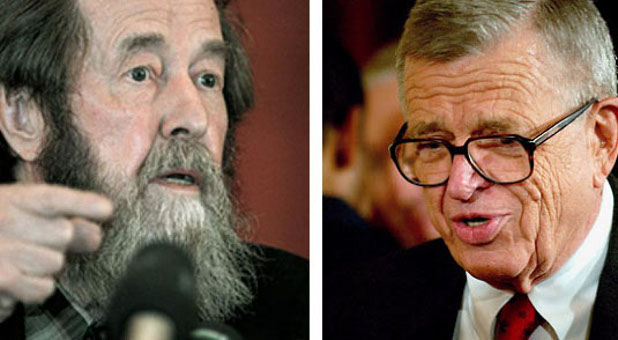“When a government starts an earnest fight against terrorism, public opinion immediately accuses it of violating terrorists’ civil rights.” –Aleksandr Solzhenitsyn (1978)
Two powerful essays by two very different individuals have challenged me to reflect on our moral obligation. The two men, now deceased, are Aleksandr Solzhenitsyn, the Nobel Prize-winning Russian author and critic of the Soviet system, and Charles Colson, the once-infamous Nixon attorney who became a committed follower of Jesus.
We are in the middle of a great debate about our moral obligation. Some of that debate will be included as we move into the fall election season. Some of that debate exists at any time of the year.
One of the most influential speeches of the 20th century was delivered by Solzhenitsyn at Harvard University’s Commencement on June 8, 1978. Acknowledging Harvard’s motto “Veritas” (truth), he prefaced his remarks by saying, “Truth is seldom pleasant; it is almost invariably bitter.”
Although his political references are somewhat antiquated (communism vs. the West), his cultural, social and moral critiques are as thought provoking today as they were a decade before the iron curtain fell. And he did not mince his words.
His message was deep and wide. He challenged the West’s decline in courage and its legalistic life, shortsightedness, loss of willpower and humanism. He even claimed “…the press has become the greatest power within the Western countries, more powerful than the legislature, the executive and the judiciary. One would then like to ask: By what law has it been elected, and to whom is it responsible?”
Perhaps you recall the firestorm he created as he spoke from such an honored platform to the social ills of our day. His insights were immediately and hotly debated.
Some of his most sobering insights, though, came when he addressed the direction of freedom. “The defense of individual rights has reached such extremes as to make society as a whole defenseless against certain individuals. It is time, in the West, to defend not so much human rights as human obligations.”
Solzhenitsyn continued, “Destructive and irresponsible freedom has been granted boundless space. Society appears to have little defense against the abyss of human decadence, such as, for example, misuse of liberty for moral violence against young people, motion pictures full of pornography, crime and horror. It is considered to be part of freedom and theoretically counterbalanced by the young people’s right not to look or not to accept. Life organized legalistically has thus shown its inability to defend itself against the corrosion of evil.”
Anyone who lives in a culture without an “objective legal scale” faces the dire unpredictability of its leaders. Solzhenitsyn experienced that under communism and called that society “A terrible one indeed” but he also said, “…a society with no other scale but the legal one is not quite worthy of man either. … Whenever the tissue of life is woven of legal relations, there is an atmosphere of moral mediocrity, paralyzing man’s noblest impulses.”
He ended his speech by referring to the “disaster” that has befallen the West. He did not describe it as a “world war disaster” but rather “…the calamity of a despiritualized and irreligious human consciousness.” Even in 1978, he believed we had “…approached a major turn in history.”
No wonder his essay generated a huge reaction. With panoramic insight, Solzhenitsyn challenged that graduating class to accept its moral obligation.
About 25 years later, Chuck Colson (with Anne Morse) wrote in “The Moral Home Front” (Christianity Today, October 2004) a challenging claim that America’s moral decline is encouraging our Islamic adversaries.
Colson’s challenge must not be ignored. “We must be careful not to blame innocent Americans for murderous attacks against them. At the same time, let’s acknowledge that America’s increasing decadence is giving aid and comfort to the enemy. When we tolerate trash on television, permit pornography to invade our homes via the internet, and allow babies to be killed at the point of birth, we are enflaming radical Islam.”
None of us wants to think that any part of our American way of life could possibly hinder how we are perceived by other cultures. We like to think we are a beacon of light in a very dark world. And, in many ways we are. But in other ways, our way of life can be very dark.
“Our hope,” according to Colson, “is to make freedom so attractive that other Muslim countries will follow suit. But when radical Islamists see American women abusing Muslim men, as they did in the Abu Ghraib prison, and when they see news coverage of same-sex couples being “married” in U.S. towns, we make our kind of freedom abhorrent—the kind they see as a blot on Allah’s creation.”
Colson’s words sound hauntingly familiar to the insights Alexander Solzhenitsyn gave in his famous Harvard speech in 1978.
We must not assume the problem is freedom. The problem is the effects of freedom without responsibility—without moral obligation. And when the West honors freedom but dishonors morality, some parts of our world get very upset. And so should we.
Colson calls this matter of U.S. decadence “an urgent priority.” And he ends his essay with these words, “If our cultural rot continues unabated, a Talibanized West may no longer be a joke but a grim reality.”
And now in 2014, open your eyes and ears; ponder what you’re seeing and hearing.
We have a moral obligation to respond.
Don Meyer is president of Valley Forge Christian College in Phoenixville, Pennsylvania, as well as a prolific writer and speaker, including ministry in more than 25 countries. He also is an ordained Assemblies of God minister and pastored a church in Franklin, Pennsylvania for seven years. Before coming to Valley Forge in 1997, Meyer was a professor and administrator at North Central University in Minneapolis for 21 years.








































